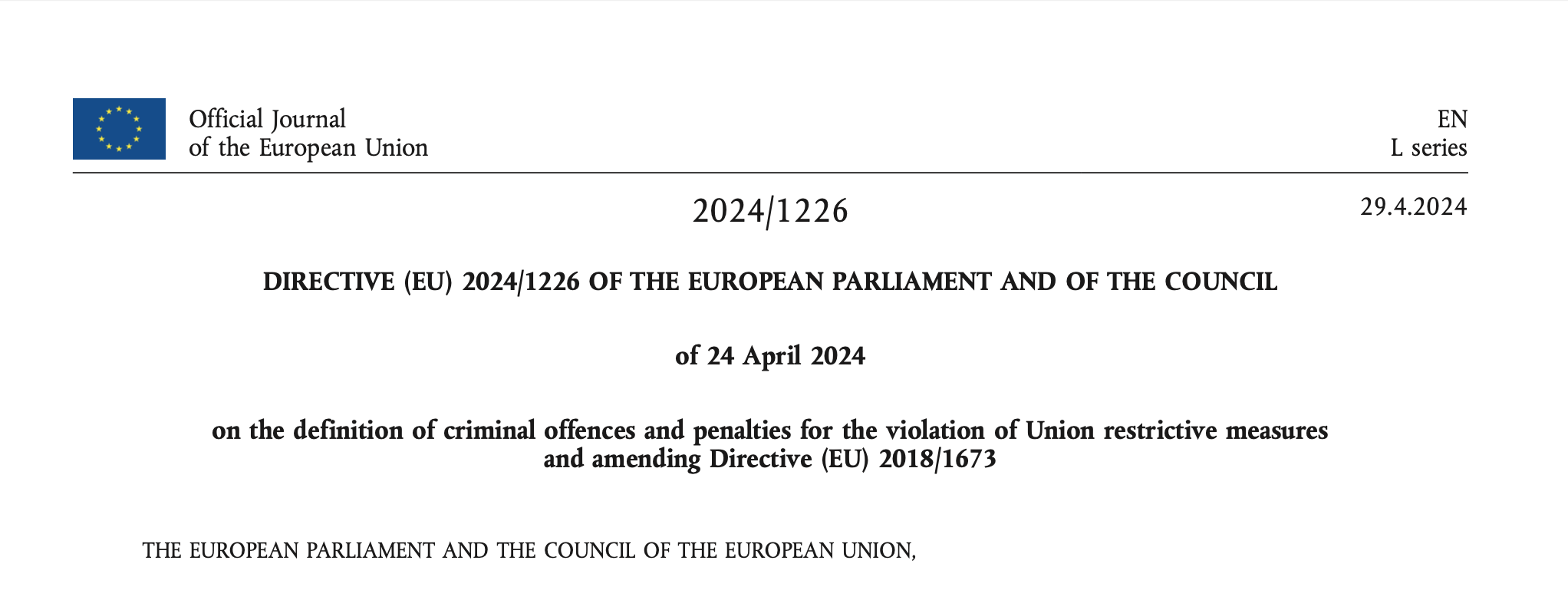Publication of Directive (UE) 2024/1226 on the Definition of Criminal Offences and Penalties for the Violation of EU Sanctions
On April 24, 2024, the European Union published in the OJEU Directive (EU) 2024/1226 of the European Parliament and of the Council of 24 April 2024 on the definition of criminal offences and penalties for the violation of Union restrictive measures and amending Directive (EU) 2018/1673[1].
The objective of Directive (EU) 2024/1226 is to ensure the effective application of the Union’s restrictive measures, adopted on the basis of Article 29 TEU and Article 215 TFEU, by establishing a set of common minimum rules concerning the definitions of criminal offence, effective, proportionate and dissuasive criminal and non-criminal penalties, as well as obligations in all Member States for investigating, prosecuting and punishing breaches of EU restrictive measures.
Based on Article 83(1) TFEU, this Directive follows the unanimous adoption, on 28 November 2022, of Council Decision (EU) 2022/2332 identifying the violation of Union restrictive measures as being related to criminal offences covered by some of the areas of crime listed in Article 83(1), such as terrorism and money laundering[2].
Currently, the Union has over forty different regimes of restrictive measures in place and their use has intensified in recent times, especially after Russia’s military aggression against Ukraine. This directive is part of an overall effort by the EU to strengthen its capacity to ensure the implementation of EU restrictive measures (see: Directive proposal on asset recovery and confiscation[3]) and more generally to promote the objectives of the Common Foreign and Security Policy, of which restrictive measures are an essential instrument.
Some of the main harmonisation measures and other provisions are presented below.
Harmonisation of criminal offences
- Violations of Union restrictive measures, including their circumvention and when committed with serious negligence (art. 3);
- Inciting, aiding and abetting a violation of EU sanctions (art. 4);
- Attempted violations (art. 4) ;
Penalties for natural persons (art. 5)
- Imprisonment: maximum term going from at least 1 to 5 years if the value is of at least EUR 100 000, and maximum term of imprisonment of at least 5 years irrespective of the value of the items involved if included in the EU Common Military List or in Annexes I and IV to the EU Dual-Use Regulation (EU) 2021/821;
- Fines: no minimum or maximum requirement;
Penalties for legal persons
- Ensure the liability of legal persons where offences have been committed for their benefit, including where accountable for a lack of supervision or control (art. 6);
- Fines for legal persons: maximum limit until at least 5% of the annual worldwide turnover or an amount corresponding to EUR 40 000 000 (art. 7);
- Other penalties: exclusion from public benefits, tenders, grants or concessions; judicial supervision, judicial winding-up; and closure of establishment;
Harmonisation of prosecution
- Limitation period to investigate, prosecute, trial, and adjudicate criminal offences of at least 5 years from the commission of the criminal offence (art. 11);
- Jurisdiction over the criminal offences (art. 12);
- Effective investigative tools, such as those used in combatting organised crime or in other serious crime cases, at the disposal of competent authorities (art. 13);
- Protection under EU Whistleblower Directive for those reporting violations of Union restrictive measures (art. 14);
- Ensure coordination and cooperation at strategic and operational level among Member States competent authorities involved in the prevention, investigation and prosecution of offences (art. 15);
- Coordination and cooperation at EU level between Member States, European Commission, Europol, Eurojust and the European Public Prosecutor’s Office (art. 16);
Statistical data
- Member States shall submit to the Commission the following annual statistics on the criminal offences (art. 17):
- the number of criminal offences registered and adjudicated;
- the number of dismissed court cases;
- the number of natural and legal persons prosecuted, convicted or fined;
- the types and levels of penalties imposed;
Evaluation, reporting and review
- The Commission is required to submit a report to the European Parliament and the Council:
- two years after the end of the transposition period(by 20 May 2027), assessing Member States’ compliance with the Directive;
- five years after the end of the transposition period (by 20 May 2030), to evaluate the Directive’s impact and effectiveness, as well as the need to update the list of the criminal offences related to the violation of Union restrictive measures;
The Directive enters into force on the twentieth day following its publication in the OJEU, and Member States will have to implement laws, regulations and administrative provisions necessary to comply with this Directiveby 20 May 2025.
[1] Directive (EU) 2024/1226 of the European Parliament and of the Council of 24 April 2024 on the definition of criminal offences and penalties for the violation of Union restrictive measures and amending Directive (EU) 2018/1673, OJ L, 2024/1226, 29.4.2024.
[2] Council Decision (EU) 2022/2332 of 28 November 2022 on identifying the violation of Union restrictive measures as an area of crime that meets the criteria specified in Article 83(1) of the Treaty on the Functioning of the European Union, OJ L 308, 29.11.2022, p. 18–21.
[3] Proposal for a Directive of the European Parliament and of the Council on asset recovery and confiscation, COM(2022) 245 final.



No responses yet